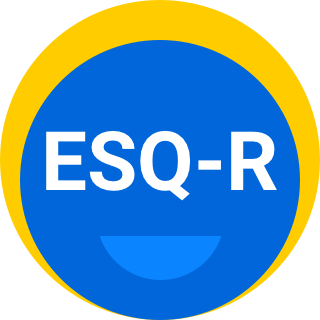
The Executive Skills Questionnaire - Revised (ESQ-R) is a self-report assessment instruments that students complete to help them (and their teachers or coaches) understand their executive skill strengths and challenges. It is a modified version of the ESQ developed by Dawson and Guare and described in a number of their books on executive skills (e.g., Executive Skills in Children and Adolescents, Smart but Scattered, Smart but Scattered Teens).
You can create a free account on PsyPack to access fillable PDFs, manuals and educational resources for the ESQ-R
PsyPack can automatically score the ESQ-R assessment and prepare corresponding tables and graphs.
Further, PsyPack automatically plots a graph to help you easily track progress over time.
Skills, Executive Skills
The purpose of the evaluation is to:
About 5 minutes
As is true of any self-report instrument, respondents can consciously distort their response to the scale if they are motivated to do so.
The authors do not have large-scale normative data on this instrument, but the ESQ-R has been employed with a sample of college students for the purpose of determining the instrument’s psychometric properties. Statistical analysis yielded strong reliability and validity correlations and, through factor analysis, identified five Skill Areas that appear to represent discrete and independent executive skill domains. The authors have labelled the five skill areas Plan Management, Time Management, Organization, Emotional Regulation, and Behavioral Regulation. The authors also have some evidence that the ESQ-R is sensitive to intervention effects.
Intended Audience - This rating scale should appeal to professionals within both education and mental health. These include school psychologists, school counselors, school social workers, and teachers, both general education and special education teachers. Increasingly, the authors have found that both speech pathologists and occupational therapists address executive skills in their work with students, and they, too, would be a potential audience. College counselors and support services staff would find this useful in helping their clients identify potential challenges to college success and even assisting with college selection, based on profiles of strengths and weaknesses. College and university learning support centers could use the ESQ-R to help pinpoint student needs and matching those needs to appropriate services. Executive skill coaches, a field that is undergoing rapid expansion, would find this scale useful, as would educational therapists (a field that is quite common in states such as California and Texas). In the mental health field, therapists and clinical psychologists are increasingly addressing executive skill challenges as part of their therapeutic work.
Potential uses - The authors envision the ESQ-R being used both for diagnostic purposes (to identify strong and weak skill areas) and to help design interventions targeting both individual students and whole classes as appropriate.
Since the authors are still gathering data on this rating scale they don’t have “norms” so they can’t tell you what is typical for any of the 5 skill areas. As a general rule of thumb, though, scores in the 2-3 range (both for Skill Area averages and for individual items) can be considered a relative weakness or problematic. Scores between 0 and 1 should be considered a relative strength or not problematic.
When working with individual students or clients, look at both the Skill Area scores and the individual item scores. Any individual item score rated as 2 or 3 is worthy of discussion because it means the respondent has identified that behavior as a problem either often (2) or very often (3). Even when an overall Skill Area looks relatively strong, individual items may highlight some behavioral challenges.
Be sure to talk with students or clients about their strong skill areas and individual items rated as 0 or 1. Identifying strengths helps people feel good about themselves—and you can also talk with them about whether they can use any of their stronger skills to compensate for their weaker skills.
The authors don’t recommend re-administering the ESQ-R more frequently than every 10-12 weeks. A teacher or coach who wants to track progress across an academic year might consider readministering the ESQ-R at the beginning of the school year and at the end of each marking period.
Dawson, P. & Guare, R. (2018). Executive skills in children and adolescents: A practical guide to assessment and interventions. 3rd Edition. New York: Guilford Press.